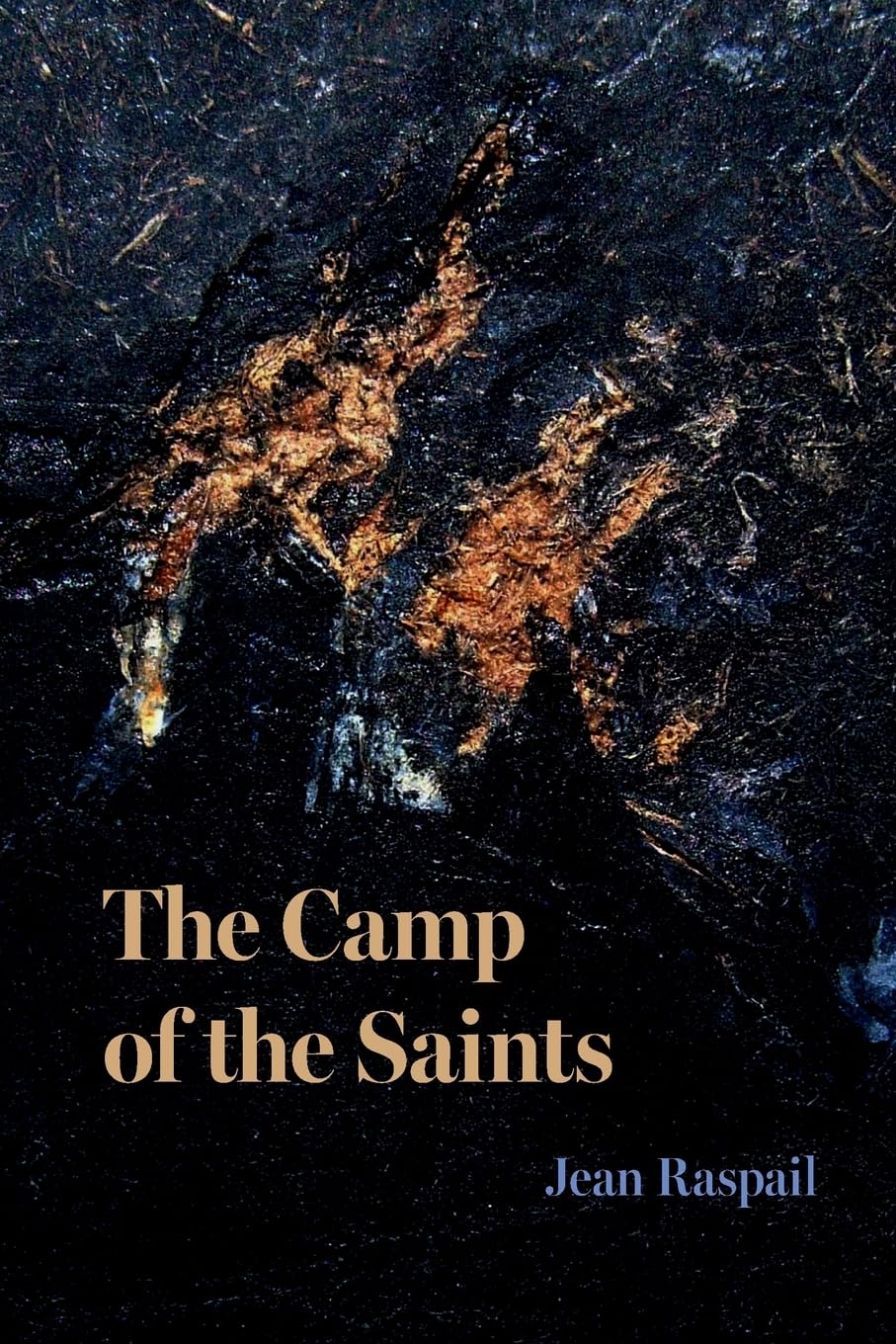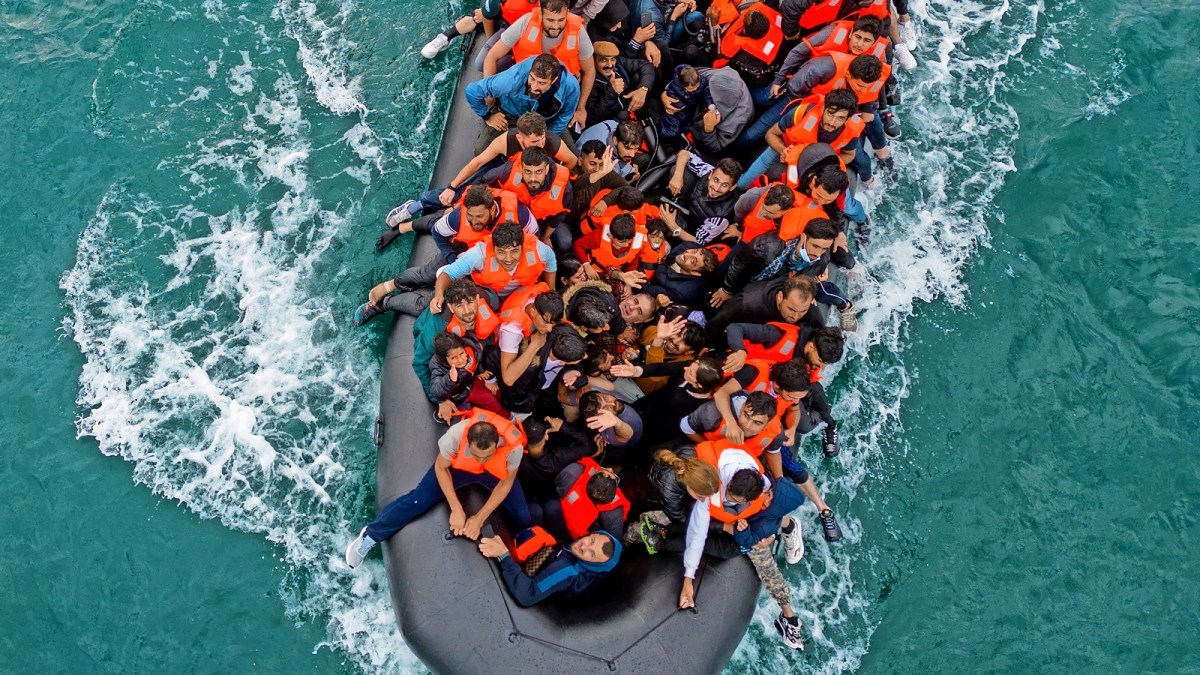The Camp of the Saints is an ugly book, even the most militant of its admirers must admit. There is good reason why this is the most controversial novel by a serious writer of the past 50 or so years. First published in French in 1973, The Camp of the Saints, because of its supposedly prophetic nature, has a growing cult status on the alt-right. Jean Raspail imagines the sudden arrival, on the beaches of the French Riviera, of a hundred vast, dilapidated vessels and nearly a million desperate immigrants from India, “the people of the Ganges”.
After weeks of futile, well-meaning debate about how to meet this looming challenge, the French state collapses. The navy refuses to intercept this armada as it crawls towards Europe. Army detachments
are sent south to repel the hordes when they land, but they mutiny and desert, refusing to fire on defenceless, starving people. The French president launches into an impressive broadcast, reminiscent of those made by leaders in wartime, demanding that the soldiers act in defence of France — but then halfway through the speech he loses his nerve, changes his mind and says they should act according to their consciences.
The collapse is truly apocalyptic — the book’s title is a quote from the Book of Revelations. The population of Provence flees north, in scenes reminiscent of the debacle of June 1940. Only a few diehards — gung-ho career officers, Catholic traditionalists and proud aristocrats — resist, holing up in a small hill village for a last stand. Meanwhile, round the world, seeing the abject weakness of the West, many more such invasion fleets are being prepared. In New York, London and Paris, the
oppressed immigrants already there rise up, seizing power unresisted, occupying apartments, rioting and raping.

The depiction of the migrants throughout is savagely, even gleefully, racist. The “floating slum” stinks atrociously because these people cook using human shit as fuel. Their leader is “a dung-roller by trade, a kneader of excrement, a shaper of guano briquettes, a coprophage in times of famine”, who bears on his shoulders a monstrously deformed son. No other individuals are singled out from this “human torrent” but it is lasciviously described as in constant sexual frenzy. “Over the bodies, between breasts, buttocks, thighs, lips, fingers, ran streams of sperm … It was thus that, in shit and lust — but also hope — the Last Chance Armada pushed on towards the West.”
Not just a repellent but a worthless book, then, by a worthless writer? Not at all. Raspail (1925-2020), although now best known for this dystopia, was the author of more than 30 remarkable novels and travel books. Although never elected a member of the French Academy, he received many distinguished prizes, including in 2003 the Academy’s Grand Prix for a life’s work.
A New York Times reviewer in 1975 damned the book as “avowedly racist”, but also observed that “Raspail is a writer of undeniable power, and his torrent of invective suggests Céline at his most choleric. His political fantasy has the fevered intensity of a unified vision, giving it a visceral impact — like a truncheon in the kidneys, say.” When it was reissued in France in 2011, it sold well (apparently half a million copies have been sold over 50 years) and received extensive media coverage, including a long, friendly interview with its author in Le Figaro.
And vicious as these passages about the migrants are, they are not the main focus of the novel. The focus instead is on the moral and spiritual collapse of the West that prevents it putting up any resistance to being overwhelmed. The bulk of the narrative turns back to the ten or so weeks that the flotilla is en route, to turn even harsher scorn on the hopeless reactions of the French politicians and commentators in the media, guilt-laden clergymen and self-serving activists, would-be benefactors and addled protesters.
• Read more book reviews and interviews — and see what’s top of the Sunday Times Bestsellers List
Here Raspail’s nasty, accomplished novel is immediately, acutely connected to what is happening in Europe right now — confronting huge demographic changes, as well as illegal immigration — not, as it turns out, through a few giant ships but numerous, unstoppable small boats. What can be done that does not compromise the very values we want to maintain? Just last month Angela Merkel tried to defend Willkommenskultur in Germany by asking: “Should we have positioned water cannon on the border? What would have become of our values in that case?”
It is no wonder that The Camp of the Saints has been such a totem for the hard right. Marine Le Pen tweeted: “We must reread The Camp of the Saints, which, beyond evoking with a talented pen the migratory perils, had, long before [Michel Houellebecq’s novel] Submission, mercilessly described the submission of our elites.” In America, it is frequently cited by Steve Bannon, Donald Trump’s former strategist. In Douglas Murray’s The Strange Death of Europe (2017) it was keenly expounded. Now years after being out of print in English, it is being reissued, in a vigorous new translation by a small American publisher, Vauban Books, which is committed to “dissidence in translation”.
So how did Raspail arrive at this prescient novel more than 50 years ago, when immigration had none of the urgency it does now? It is not typical of his voluminous literary output. Raspail was a wildly romantic, extreme conservative who travelled the world in search of indigenous peoples and their traditions endangered by modernity. His first great adventure in his early twenties was to lead a canoe trip from Quebec to New Orleans, retracing the journey of a 17th-century Jesuit priest, in the course of which he was much struck by an abandoned Algonquin camp in Lake Huron. Further journeys followed, including from Tierra del Fuego to Alaska by car, an expedition in search of the Incas, and a whole year in Japan.

Jean Raspail in 1995
LOUIS MONIER/GAMMA-RAPHO VIA GETTY IMAGES
Later in his career, as well as such travelogues, Raspail developed a peculiar form of fantasy historical fiction in which ancient traditions, especially monarchies and dynasties, were revived. In Sire (1991) he fondly imagined the return of an 18-year-old Bourbon monarch to France in 1999; in The Ring of the Fisherman (1995), the line of the Avignon popes is re-established. Raspail was so taken with the romance of a 19th-century French adventurer who declared himself king of Patagonia that thereafter he himself long pretended to be consul-general of that monarchy, complete with regalia.
• The 25 best novels of the 21st century
At Easter in 1971 Raspail was staying in a colossal villa belonging to his aunt, with a private beach on the Cote d’Azur. Looking out to sea from the library, he said to himself: “And what if they came?” He did not know who they would be but it seemed to him inevitable that they would come, so disparate in numbers and wealth were the populations of the world. In May that year he published a column fully envisaging the novel he was yet to write, save that he initially imagined just 20 ships and 100,000 of the wretched aboard.
It could be argued that Raspail was animated by the idea of France as a civilisation under threat, in much the same way as the civilisations of the many indigenous peoples he had sought out and memorialised. That was not the product of simple racism. Indeed his biographer, Philippe Hemsen, insists: “If one take the term ‘racism’ in its current sense of hostile prejudice, contemptuous in relation to people belonging to other races, other ethnicities, then Jean Raspail was the exact opposite of a ‘racist’.” Perhaps, perhaps not.
But even if the almost intolerably scathing and plethoric The Camp of the Saints is far from being one of the great dystopias, not a Nineteen Eighty-Four or a Brave New World, it remains closely, horribly relevant to our dilemmas right now. This new translation could not be more timely, more fraught.
The Camp of the Saints by Jean Raspail, translated by Ethan Rundell, is published by Vauban Books (£19.45)

